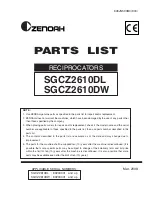
20 ENGLISH
Guide fences
WARNING:
Before operating the tool, make
sure that the upper fence is secured firmly.
WARNING:
Before bevel-cutting, make sure
that no part of the tool, especially the blade, con-
tacts the upper and lower fences when fully low-
ering and raising the handle in any position and
while moving the carriage through its full range
of travel.
If the tool or blade makes contact with
the fence this may result in kickback or unexpected
movement of the material and serious personal injury.
Use upper fences to support the material higher than
the lower fences. Insert the upper fence into the hole on
the lower fence and tighten the clamping screw.
1
2
3
1
2
3
4
4
►
1.
Upper fence
2.
Lower fence
3.
Clamping screw
4.
Adjusting screw
NOTICE:
The lower fences are fixed to the base in
the factory. Do not remove the lower fences.
NOTICE:
If the upper fence is still loose after tight-
ening the clamping screw, turn the adjusting screw to
close a gap. The adjusting screw is factory adjusted.
You don't need to use it unless needed.
You can store the upper fences onto the holder when
not in use. Use the clip on the upper fence to hold it on
the holder.
1
2
3
►
1.
Holder
2.
Upper fence
3.
Clip
Vertical vise
WARNING:
The workpiece must be secured
firmly against the turn base and guide fence with
the vise during all operations.
If the workpiece is
not properly secured against the fence the material
may move during the cutting operation causing
possible damage to the blade, causing the material
to be thrown and loss of control resulting in serious
personal injury.
1
2
3
4
►
1.
Vise arm
2.
Vise rod
3.
Clamping screw
4.
Vise
knob
The vertical vise can be installed in two positions on
either the left or right side of the base. Insert the vise
rod into the hole in the base.
Position the vise arm according to the thickness and
shape of the workpiece and secure the vise arm by
tightening the screw. If the clamping screw contacts
the carriage, install it on the opposite side of vise arm.
Make sure that no part of the tool contacts the vise
when lowering the handle all the way. If some part
contacts the vise, re-position the vise.
Press the workpiece flat against the guide fence and the
turn base. Position the workpiece at the desired cutting
position and secure it firmly by tightening the vise knob.
NOTE:
For a quick setting of workpiece, turning the
vise knob to 90° counterclockwise allows the vise
knob to be moved up and down. To secure the work
-
piece after setting, turn the vise knob clockwise.
Содержание DLS112
Страница 31: ...31 ...













































